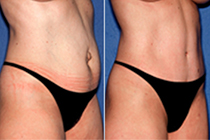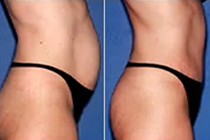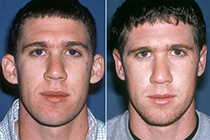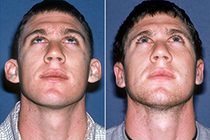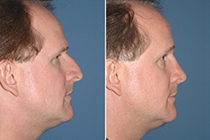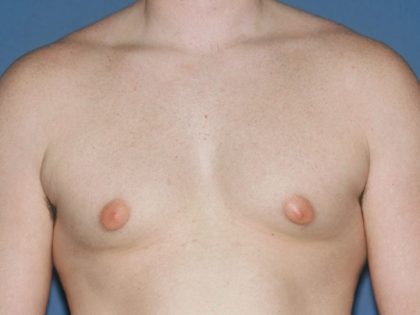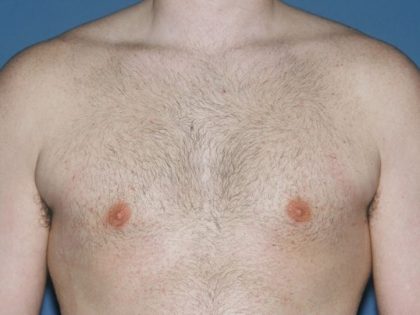Gynecomastia
Conveniently located to serve the areas of Dallas, TX

Gynecomastia is a common condition that results in male breast growth, severely affecting men’s sense of confidence. The presence of breast tissue can leave men with a more feminine-looking appearance that leaves them feeling uneasy about showing their chest. The condition is not simply fat development- it includes excess glandular tissue growth. It often begins in puberty, but it may also result from liver/thyroid issues or other unwanted hormonal disturbances. Even after correcting these health problems and losing weight, this breast tissue persists, so only surgery offers a permanent solution.
At USA Plastic Surgery, our cosmetic breast reduction surgery aims to help men feel more masculine and comfortable with the contours of their chest. With Dr. Steven J. White’s techniques, these minimally invasive procedures do not leave significant scarring and can help highlight a more defined, muscular upper body. With proper weight management, men can enjoy their renewed look for the rest of their lives.
To request your gynecomastia surgery consultation today, call Dr. White’s office at (214) 833-6751, let us know more by filling out our contact form, or stop by our location in Dallas.
Contents
Before and After Photos
Gynecomastia and Its Causes
Simple weight loss will not completely resolve gynecomastia. Men with the condition typically have more fat in the area alongside fibrous and glandular tissue that is more abundant in women. Though the male body is incapable of producing milk since they do not have lobule structures, the development of these other tissues can make the chest look more prominent and like female breasts. The areolas may also appear larger.
In the early teen years, many boys experience some breast growth, but they usually grow out of it due to increasing testosterone levels. For those who go on to develop gynecomastia in adulthood, testosterone levels stay lower relative to estrogen.
Liver and Thyroid Dysfunctions
Research shows that liver dysfunctions directly impact the gonadal (teste) health of men, affecting the source of most testosterone production for men. Because of this, men with chronic liver damage have an impaired ability to maintain healthy sex hormone levels. (2) This is also why men who use certain drugs or alcohol are at an increased risk of developing feminine-like breasts or gynecomastia. Similarly, men with thyroid issues or hyperthyroidism– an overactive thyroid– have disruptions in the ratio between testosterone and estrogen (3) which can lead to the development of breast tissue.
Pseudo-Gynecomastia and Obesity
Many times, breast growth can be attributed to obesity, and this is not the same as gynecomastia. Clinicians refer to this as a pseudo-gynecomastia, and men can resolve it completely by achieving a healthier weight. Still, there is some correlation between gynecomastia and weight gain and weight-related conditions; studies find that one-third of men with true gynecomastia have elevated blood sugar levels. There is also research that many affected men have a family history of the condition as well as diabetes, so there is often a strong genetic influence at play. (4)
Candidates
If you are a healthy man who is self-conscious about the appearance of your chest, you are likely an ideal candidate for one of Dr. White’s personalized treatments. Before undergoing surgery, he will first assess your chest tissue to determine if true gynecomastia is the cause of your breast enlargement. You should be at or close to your ideal weight and have youthful skin with no sagging tissue present. If you have lax skin, Dr. White will have to incorporate an additional technique to address this during your surgery. You should ideally be a non-smoker, but Dr. White will consider treatment if you commit to quitting temporarily to facilitate an easier, healthier recovery process.
Consultation
During your consultation, Dr. White will ask you about your goals for surgery, your experience with having an enlarged chest, and aspects of your medical history. He will evaluate your BMI and examine the tissues to see if you have the condition. Men with true gynecomastia have breasts that are proportioned and round and often have larger areolas than what is typical for a man. He will then outline your treatment options given your specific circumstance. You will have an opportunity to ask questions about his recommendations to help you decide if surgery is right for you. If you feel confident about what the procedure can accomplish for you, Dr. White can proceed with giving your preparation instructions and details about your recovery.
Your journey toward becoming the most attractive and confident version of yourself can begin today with a consultation at our practice in Dallas. Call (214) 833-6751 or use our online form to get in touch with our staff.
How to Prepare
Approximately 2 weeks before your surgical appointment, you should stop taking blood-thinning substances that can pose a risk for complications. Dr. White will be sure to review your current prescriptions and supplements to give you the proper advice concerning this vital preparation step. He may review your blood tests to get an accurate idea of your health beforehand. If you regularly smoke, you will have to stop temporarily to boost quality circulation throughout your body. To ease your recovery, you should make sure to pick up all required prescriptions and other OTC medications that Dr. White approves of before your procedure.
What to Expect
Depending on the severity of your gynecomastia, Dr. White will either need to apply liposuction or use it in combination with skin excision techniques. For more severe cases, he may need to make an incision around each areola. This may include lift techniques, nipple repositioning, or even the use of a skin graft. This incision location will fade significantly within the darker skin of the areola, so you will not have to worry about the scarring after your recovery.
Liposuction Procedure Steps
Liposuction is a relatively minor procedure that only requires tiny incisions (a centimeter or less). After making this incision, Dr. White will administer tumescent fluid into the subcutaneous fat tissue of the chest, allowing it to loosen from other connective tissues. The solution will also restrict blood loss to promote a more comfortable recovery. After it fully settles, Dr. White will use the same incision to apply suction pressure to rid the chest of unwanted fat deposits. After reshaping the chest as much as possible, he may place a surgical bandage over each liposuction incision and continue with more extensive lift techniques and glandular excision if necessary.
Recovery and Results

You will have bruising and swelling in and around your chest area for the first 2 weeks following your procedure, but Dr. White will give you a compression garment to help reduce these effects and assist with the healing process. The garment will also help the skin adhere to your new contours and protect the incisions from friction and the possibility of infection. After the first week, you will likely feel well enough to return to work, so long as it is not physically strenuous. Within a month of your procedure, all residual swelling will be gone, and you will get to enjoy the final results! Dr. White will re-evaluate to see when you can safely return to the gym. Usually, it takes around 6 to 8 weeks to recover enough to resume gym activities. Dr. White will recommend that you lift weights to further define your masculine appearance and maintain your weight.
Cost of Gynecomastia Treatment in Dallas
The cost of your gynecomastia surgery will depend on anesthesia fees, specific techniques used, post-operative medications, follow-up appointments, and other fees that will contribute to amazing results you can feel proud of. Dr. White will give you a total cost estimate during your consultation to help you make an informed decision.
Many men find that gynecomastia surgery is transformative and finally relieves them of the burden of feeling self-conscious at the pool or beach. We encourage you to explore your options at USA Plastic Surgery by calling (214) 833-6751 or using our contact form to learn more. Dr. White will provide you with a comfortable experience for you to express your concerns.
FAQ
Is it dangerous to have gynecomastia?
Gynecomastia usually does not indicate any major health problems, but it is associated with abnormal liver and thyroid functioning, obesity, and hormonal dysfunctions. Always check with a physician to evaluate your health as a whole. This should include an assessment of hormone levels with blood tests.
Are the results of gynecomastia surgery permanent?
Yes, the results of this procedure are considered to be permanent. While surgeons permanently remove excess fat and/or glandular tissue, fat can redevelop. You should follow a healthy lifestyle and diet that will help you maintain your weight. You should consider attending regular check-ups with blood tests to monitor your hormone levels.
Does having gynecomastia increase your chance of breast cancer?
Men, in general, make up less than 1% of all breast cancer patients. Having gynecomastia can slightly raise your risk of cancer, but not significantly. This is mostly due to elevated estrogen levels. Men with the condition should pay attention to this aspect of their health, regardless of whether or not they decide to undergo surgery.
Can gynecomastia go away on its own?
Gynecomastia will never completely go away on its own since fibrous and glandular breast tissue does not recede with weight loss. Only a surgery that addresses this excess tissue can create a more masculine-looking chest.
References
- Cayci C, Simmons P, Petty P, Lemaine V. Gynecomastia in Adolescent Males. Seminars in Plastic Surgery. 2013;27(01):056-061. doi:https://doi.org/10.1055/s-0033-1347166
- Vaishnav B, Tambile R, Minna K, et al. Study of Gonadal Hormones in Males With Liver Cirrhosis and Its Correlation With Child-Turcotte-Pugh and Model for End-Stage Liver Disease Scores. Cureus. Published online January 21, 2023. doi:https://doi.org/10.7759/cureus.34035
- Sakulterdkiat T, Romphothong K, Chatchomchuan W, et al. Unilateral gynecomastia as an initial presentation of hyperthyroid Graves’ disease. Endocrinology, Diabetes & Metabolism Case Reports. 2021;2021. doi:https://doi.org/10.1530/edm-20-0140
- Kulshreshtha B, Arpita A, Rajesh P, et al. Adolescent gynecomastia is associated with a high incidence of obesity, dysglycemia, and family background of diabetes mellitus. Indian Journal of Endocrinology and Metabolism. 2017;21(1):160. doi:https://doi.org/10.4103/2230-8210.196022




